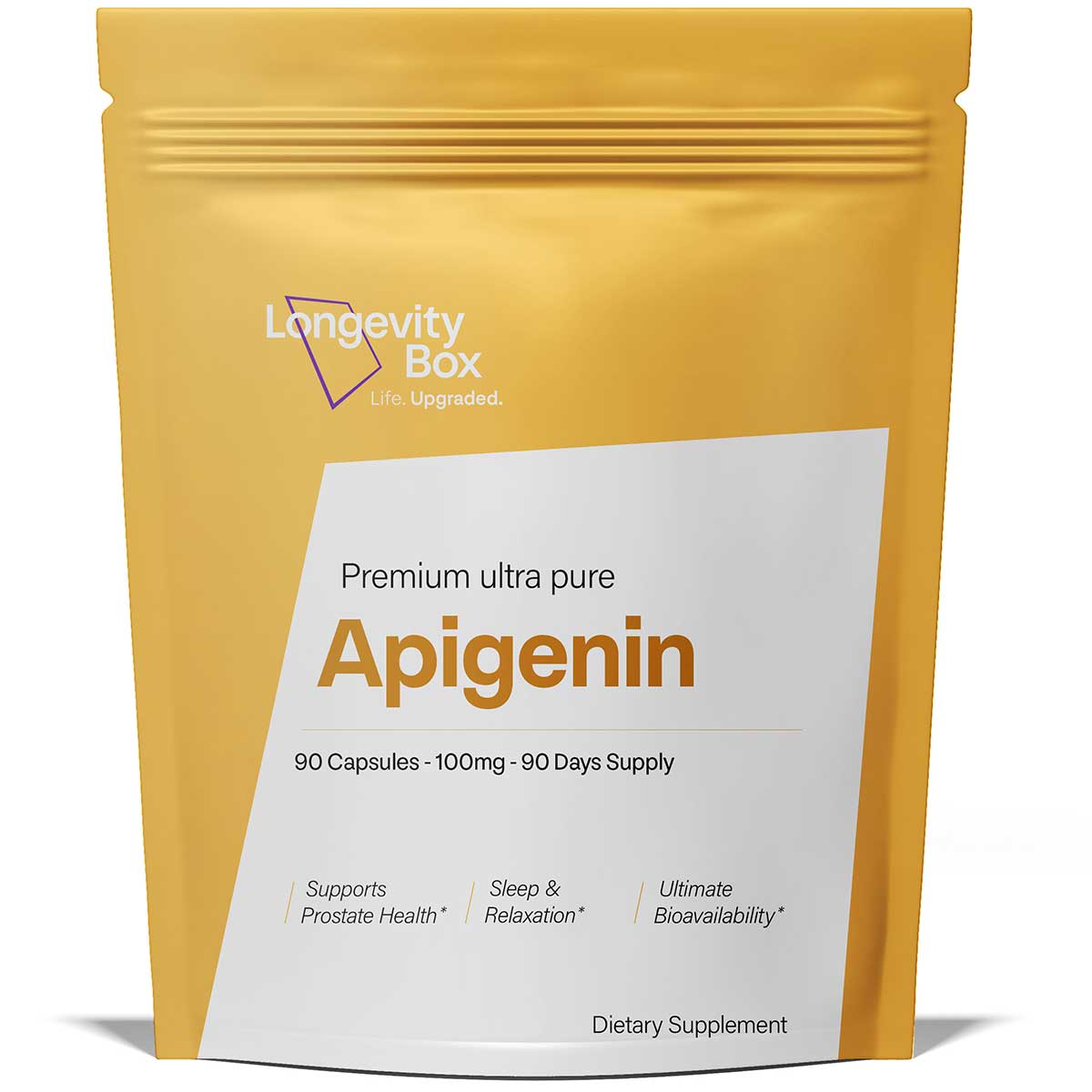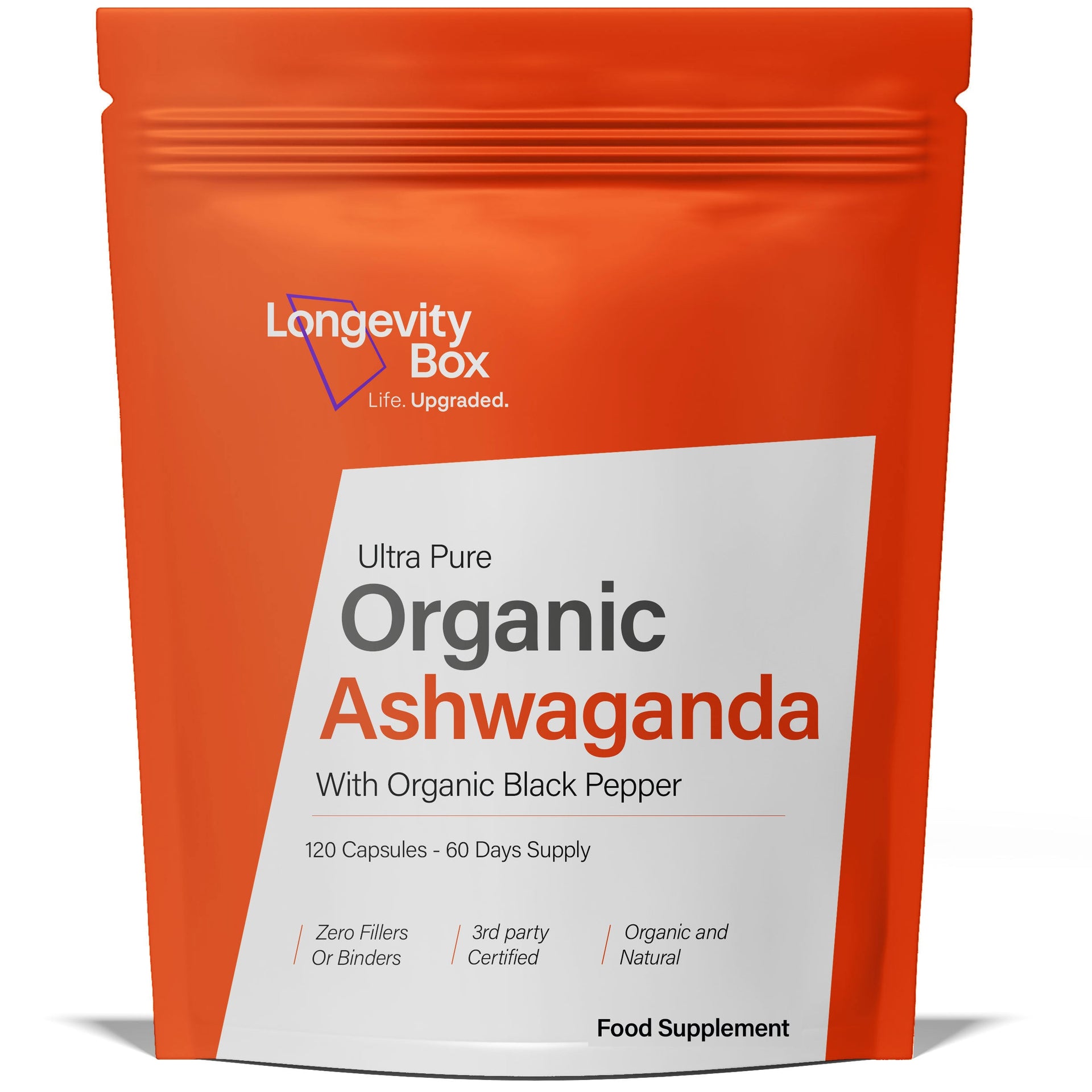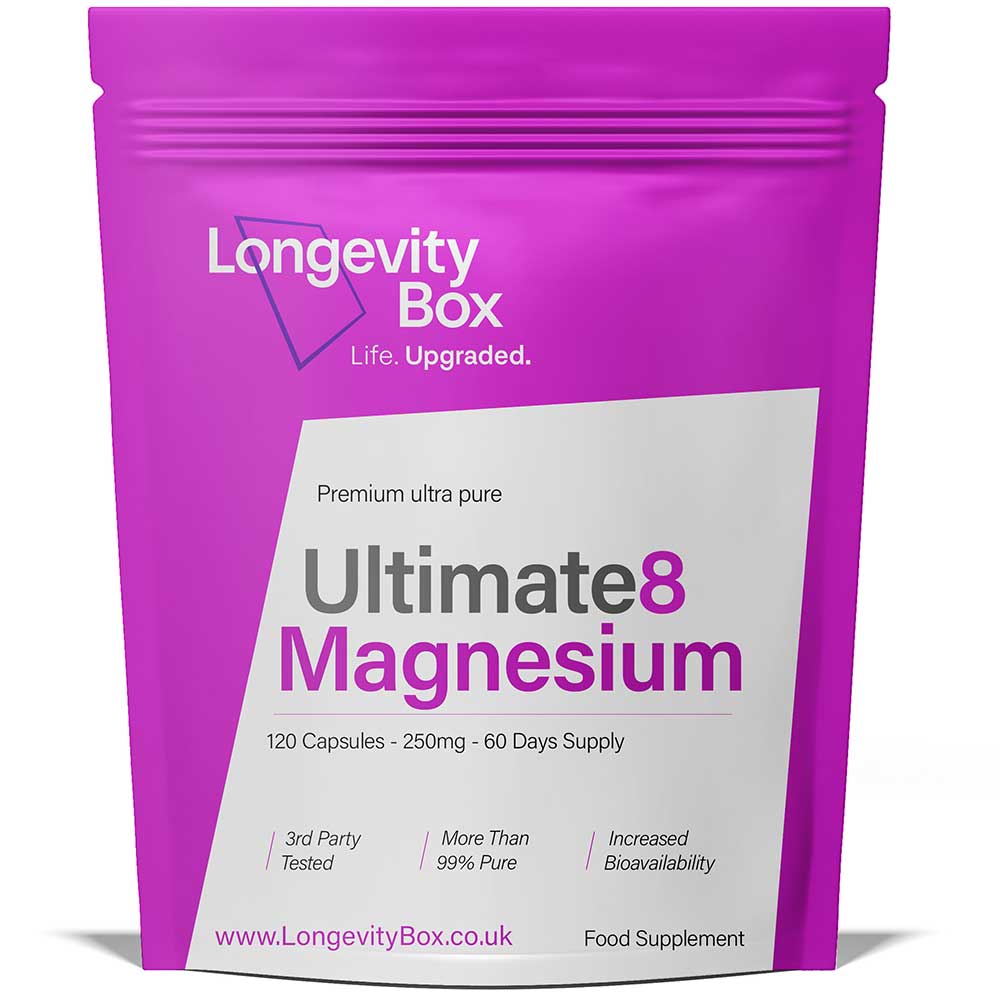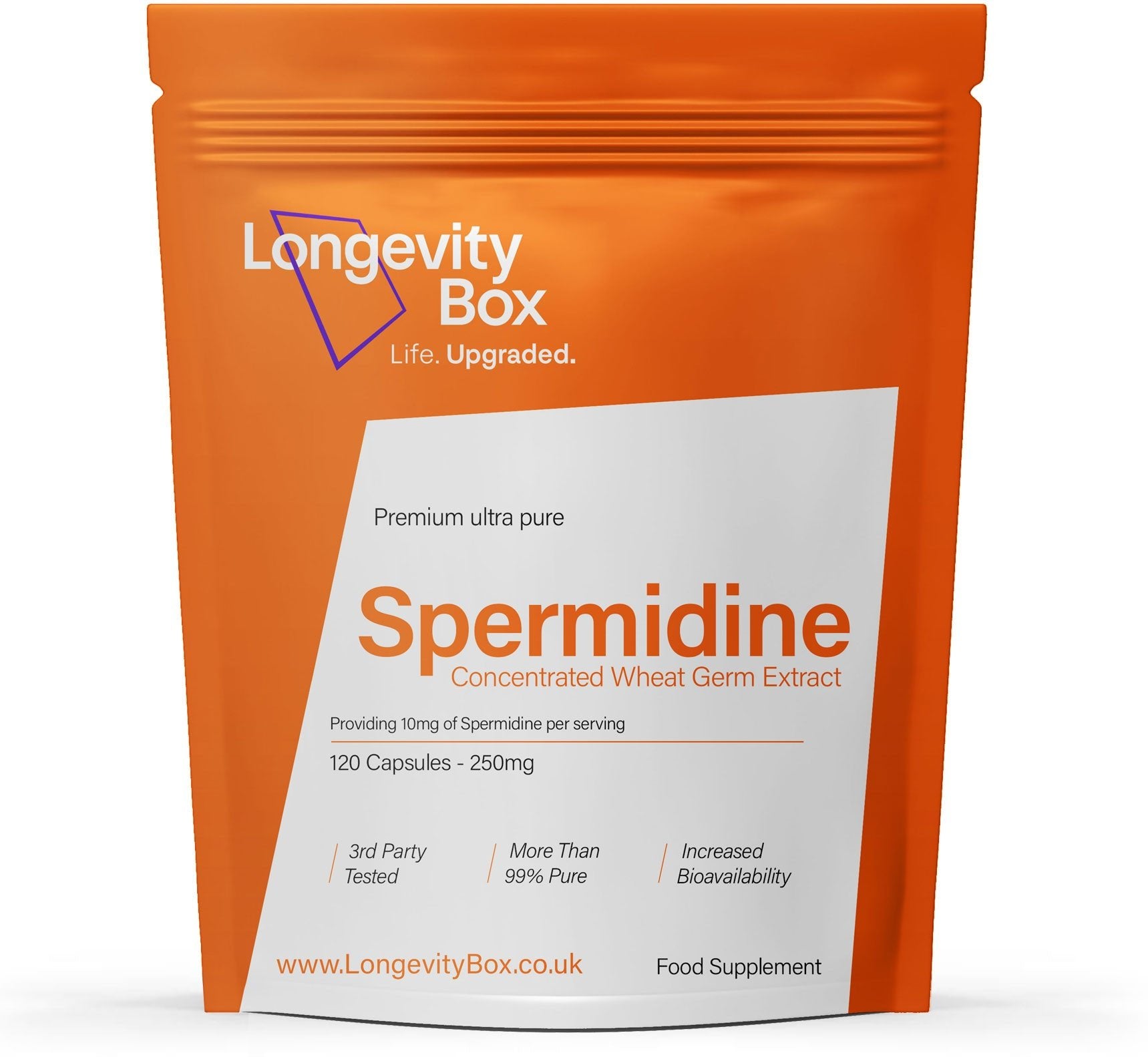Introducing our ultimate stack to reduce and proactively manage inflammation:
- Magnesium
- Apigenin
- Ashwagandha
- Spermidine
Save 25% when you buy as a bundle!
Ultimate 8 Magnesium Complex
Magnesium is an essential mineral that plays a crucial role in various biochemical processes within the body. Magnesium can have a positive impact on inflammation in several ways:
Regulation of Immune Response: Magnesium is involved in the regulation of the immune system, which plays a key role in inflammation. It helps modulate the production and activity of immune cells and cytokines, which are involved in the inflammatory response.
Antioxidant Properties: Magnesium acts as a cofactor for several antioxidant enzymes, including superoxide dismutase. Antioxidants help neutralize harmful free radicals that contribute to inflammation and tissue damage.
Vasodilation: Magnesium helps relax and dilate blood vessels, which can improve blood flow and reduce inflammation. Proper blood flow is important for delivering oxygen and nutrients to tissues and removing waste products.
Reduction of CRP Levels: C-reactive protein (CRP) is a marker of inflammation. Some studies have suggested that magnesium supplementation may help lower CRP levels, indicating a potential reduction in inflammation.
Nerve Function and Pain Relief: Magnesium plays a role in nerve function and can have a calming effect on nerves. This may contribute to pain relief and the reduction of discomfort associated with inflammation.
Cellular Energy Production: Magnesium is essential for the production of adenosine triphosphate (ATP), the primary energy molecule in cells. Adequate ATP levels support cellular function and can help regulate inflammatory responses.
Modulation of Inflammatory Pathways: Magnesium is involved in several biochemical pathways that are linked to inflammation. It can affect the production of inflammatory mediators and signaling molecules.
Apigenin
Apigenin is a flavonoid compound found in various plants, including parsley, chamomile, celery, and certain fruits. It is known for its potential health benefits, including its anti-inflammatory properties. Here's how apigenin may help with inflammation:
Inhibition of Inflammatory Pathways: Apigenin has been shown to inhibit the activity of certain enzymes and signaling pathways that are involved in the production of inflammatory molecules. For example, it can suppress the activity of enzymes like cyclooxygenase-2 (COX-2) and lipoxygenase, which are responsible for producing prostaglandins and leukotrienes, respectively, both of which are involved in the inflammatory process.
Antioxidant Effects: Apigenin possesses antioxidant properties, which means it can neutralize harmful free radicals in the body. Free radicals contribute to oxidative stress, which is linked to inflammation and various chronic diseases. By reducing oxidative stress, apigenin may help mitigate inflammation.
Modulation of Immune Responses: Apigenin has been shown to affect immune cells and cytokines, which are key components of the immune response. It can influence the production and activity of pro-inflammatory cytokines and chemokines, potentially dampening the immune-mediated inflammation.
Inhibition of NF-κB Pathway: Nuclear factor-kappa B (NF-κB) is a central regulator of inflammation. Apigenin has been found to inhibit the activation of the NF-κB pathway, thereby reducing the expression of pro-inflammatory genes and cytokines.
Anti-Inflammatory Effects in Gut Health: Apigenin's anti-inflammatory properties may be particularly relevant to gut health. It has been studied for its potential to alleviate inflammation in conditions like inflammatory bowel disease (IBD) by reducing gut inflammation and improving intestinal barrier function.
Neuroprotective Effects: Apigenin has been investigated for its potential neuroprotective effects, including its ability to reduce inflammation in the brain. This could have implications for conditions related to neuroinflammation, such as neurodegenerative diseases.
Interactions with Cell Signaling: Apigenin can interact with various cell signaling pathways, including those related to inflammation. By modulating these pathways, it can influence the expression of inflammatory mediators and help regulate the overall inflammatory response.
Ashwagandha
Ashwagandha (Withania somnifera) is an adaptogenic herb commonly used in traditional Ayurvedic medicine. It has gained popularity in recent years for its potential health benefits, including its anti-inflammatory properties. Here's how Ashwagandha helps with inflammation:
Anti-Inflammatory Compounds: Ashwagandha contains bioactive compounds called withanolides, which are believed to contribute to its anti-inflammatory effects. Withanolides have been shown to inhibit the production of pro-inflammatory cytokines and other inflammatory mediators.
Cortisol Regulation: Ashwagandha is known to have stress-reducing properties and can help regulate the release of cortisol, a stress hormone. High levels of chronic stress can contribute to inflammation. By helping the body better manage stress, Ashwagandha may indirectly contribute to reducing inflammation.
Modulation of Immune Responses: Ashwagandha has been shown to modulate immune responses by influencing immune cell activity and cytokine production. It may help balance the immune system, preventing excessive inflammation while still allowing for an appropriate immune response.
Antioxidant Effects: Ashwagandha possesses antioxidant properties, which can help neutralize free radicals and reduce oxidative stress. Oxidative stress contributes to inflammation and is implicated in various chronic diseases.
Inhibition of Inflammatory Enzymes: Some studies suggest that Ashwagandha may inhibit the activity of enzymes involved in the production of inflammatory compounds, including cyclooxygenase-2 (COX-2) and inducible nitric oxide synthase (iNOS).
Neuroprotective Effects: Ashwagandha has been investigated for its potential neuroprotective effects, which could involve reducing inflammation in the brain. This could be beneficial for conditions related to neuroinflammation and neurodegeneration.
Gut Health Support: Emerging research suggests that Ashwagandha may have a positive impact on gut health. A healthy gut is important for overall well-being, and gut inflammation can contribute to systemic inflammation. By promoting a balanced gut environment, Ashwagandha might indirectly help with inflammation.
Spermidine
Spermidine is a naturally occurring polyamine compound found in various foods, including soybeans, wheat germ, and aged cheese. It has gained attention for its potential health benefits, including its role in inflammation modulation. Here's how spermidine helps with inflammation:
Autophagy Induction: Autophagy is a cellular process that involves the degradation and recycling of damaged cellular components. Spermidine has been shown to induce autophagy, which helps remove dysfunctional cellular components and reduces the accumulation of cellular debris that can trigger inflammation.
Antioxidant Properties: Spermidine has antioxidant effects that help neutralize harmful free radicals and reduce oxidative stress. Oxidative stress contributes to inflammation and various chronic diseases. By reducing oxidative stress, spermidine may indirectly contribute to inflammation reduction.
Inhibition of Inflammatory Cytokines: Spermidine has been found to downregulate the production of pro-inflammatory cytokines such as interleukin-1β (IL-1β) and tumor necrosis factor-alpha (TNF-α). These cytokines play a central role in initiating and amplifying the inflammatory response.
Modulation of Immune Responses: Spermidine can influence immune cell activity and balance the immune response. It may help regulate the function of immune cells, preventing excessive inflammation while still allowing for an effective immune defense.
Interaction with Inflammatory Pathways: Spermidine can interact with various cellular pathways involved in inflammation. It has been found to affect the activity of transcription factors and enzymes that regulate the expression of inflammatory genes.
Cardiovascular Health: Spermidine has been associated with improved cardiovascular health. Chronic inflammation is linked to cardiovascular diseases, and by reducing inflammation, spermidine might contribute to better heart health.
Neuroprotective Effects: Spermidine has shown potential neuroprotective effects, which could involve its ability to reduce inflammation in the brain. This may be relevant for conditions related to neuroinflammation and neurodegeneration.
BE MORE JELLYFISH
The science of Longevity is growing at breakneck speed and tens of BILLIONS of dollars are being invested in solutions to help us all slow aging. But until 'Longevity Escape Velocity' has been achieved, we should all be more like Turritopsis Dohrnii jellyfish - which do not age - and we should invest in our long-term health with a healthy lifestyle, supported by longevity supplements.
WorldWide
Guarantee
Payment
Policy






